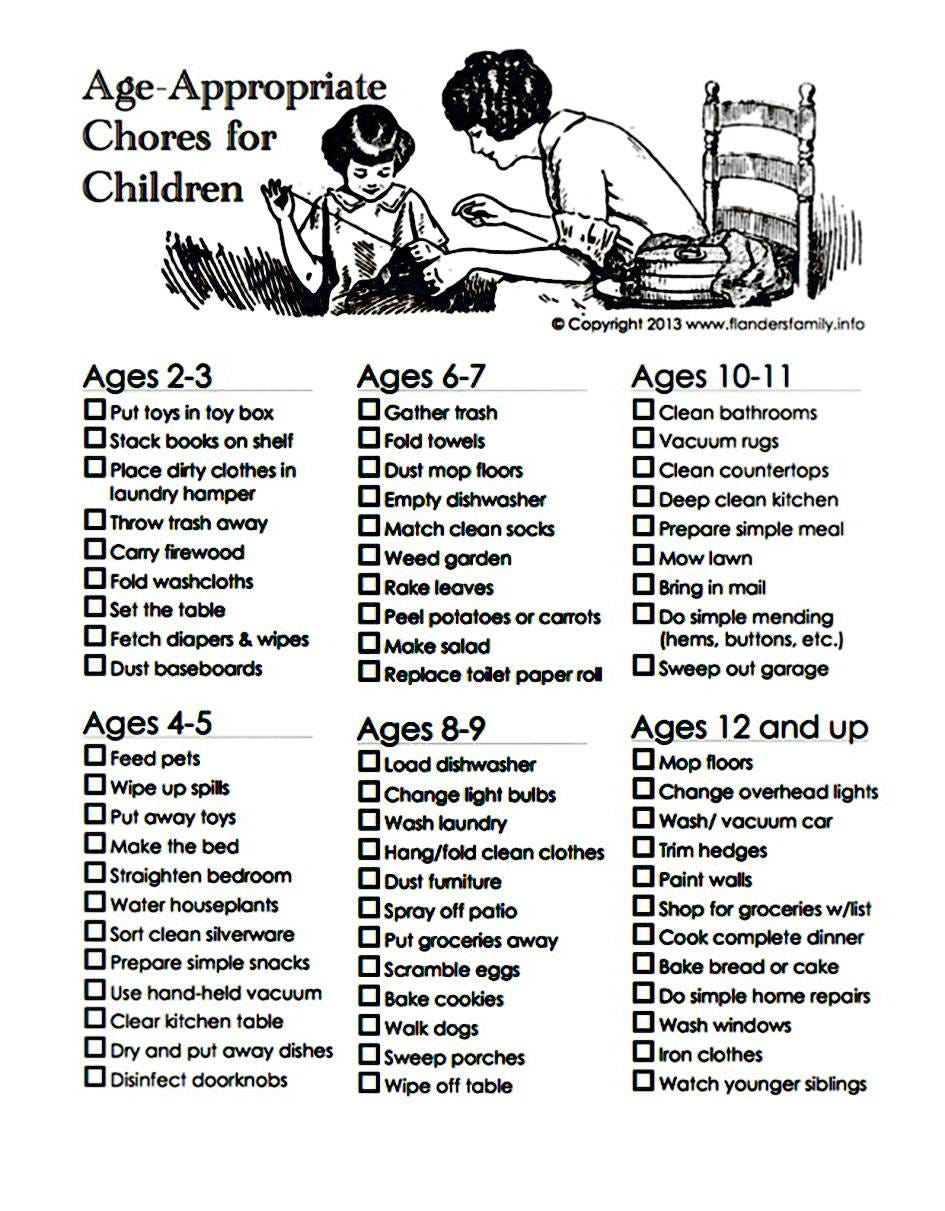Tired of the power struggles and emotional meltdowns when it comes to chores? If you’re ready for a new way to handle chores that doesn’t feel like a battle you’re in the right place! Discover the fresh, easy-to-implement system that changed everything for us!
Don’t forget to get my FREE editable chore charts for paid subscribers here!


Today, I’m breaking down:
- Why kids need chores
- When to start
- A list of age-appropriate chores
- And finally, the NEW chore system that smart parents are using to make chores a breeze.
Why Kids Need Chores
First of all, chores are NOT free labor.
I’ve seen this narrative on the internet WAY to often, where people claim chores are traumatizing/taking advantage of our kids for free labor – and that’s simply not true in a healthy home.
In fact, chores are actually REALLY important for your kids’ growth.
They foster:
- Responsibility
- Self-esteem
- Confidence
- Empathy
- Teamwork
- Motor skills and planning abilities
And yes, chores can even reduce unwanted behaviors! When kids are involved in meaningful work, they feel like they’re part of something bigger and that’s such an important foundation for life.
Chores build character and trust
Imagine your child cleaning up after themselves and feeling proud instead of resentful. That’s how chores can build character—things like trust, integrity, accountability, and self-regulation are all practiced through regular chores.
For instance, our friends dad chops firewood and his child really wants to use the axe, but that’s something that requires responsibility and trust. Something the child can build through doing other chores first to show they are capable of handling that next level of responsibility.
Reframing the narrative around chores:
They aren’t just about keeping the house clean; they’re about raising capable, independent, and emotionally intelligent humans.
I bring this up, because if you have any resentments towards your parents about chores growing up, it could impact your ability to implement a chore system that actually works for your family, so be sure you’re clear on what’s happening within you when the topic comes up because kids typically read our energy over our words.
When to Start Chores
They earlier the better.
Truly, start with a clean up routine you do around them as babies when they can’t crawl. Singing a song or putting on a certain type of music, where it’s a rhythmic part of your day.
For toddlers, you can start small with basic sorting activities or larger motor activities like wiping. My husband loved bringing our toddlers to the car wash, having them sort everyone’s junk from the car into boxes (kids, parents, trash, etc.) and even giving them a turn holding the vacuum or windshield cleaner while he held them up.
It’s the perfect way to start building those habits.
More ideas for littles:
- 1 to 2 years old: Helping collect or switch the laundry, putting new toilet paper rolls in each bathroom, starting to wiping down surfaces with you.
- 3 to 4 years old: Sorting laundry, folding simple items like washcloths and shorts.
And here’s the big secret:
Don’t wait for nap time to do your own housework like laundry or meal prep – do it together! Or at least in front of them, if they get bored and wander off.
We batch make cookie dough that I roll up into 2 logs, one in the freezer, one in the fridge, so the kids help make the batter.
If I need to prep a meal, I give them kid knives and some veggies to practice chopping and snacking on while I cook.
Basically look at what takes YOU need to get done, and consolidate them when your kids are around so you have more time for yourself.
Watching what goes into making a household run is SO important for them as they become adults. Too often this part is hidden away or done while they are out and as adults, they are shocked by how much work there is actually to do.
Sure, it’ll take a little longer upfront, but trust me, it pays off in the long run!
Age-Appropriate Chores (What to Expect at Every Age)
I found this Montessori-inspired chore chart years ago, and it’s been a lifesaver.


You’ll see for 2 to 3 year olds, a lot of the skills being worked are sorting, very basic motor skills, and strength building.
As kids get older, we introduce more care of other activities, more detailed care of self activities, more detailed sorting.
With that in mind, I’ve adjusted the list for our own personal pain points, that work the same skills for that age. For instance, my kids don’t set the table, but they do reset the backyard and garage put things back where they go. They don’t carry firewood, but they do carry in groceries. They do wipe up spills AND they wipe down walls.
I’m big on adjusting based on your family’s specific needs. For example, my kids used to leave crumbs all over my office (I mean everywhere!). It was driving me CRAZY. So, I made cleaning up the office part of their daily chores.
And if you’re paying attention, you may notice by now that chores and boundaries often go hand in hand, which leads me to….
The NEW Chore System: Time Blocking for Kids
I’ve worked for myself the last 8 years and time blocking is a pretty big productivity hack that basically has you grouping similar items together before going on to a “reward.”
As an entrepreneur this has typically looked like doing 3 tasks then going for a walk or 3 tasks then watching 30 min of TV or whatever. It’s provided a level of accountability without burnout that’s been essential in my career.
Similarly, instead of having your kids run through a massive checklist of chores that inevitably ends and tears or fighting because it’s just overwhelming, group tasks into chunks for different parts of the day.
Here’s how it works:
A small group of chores and then they can (fill in the blank).
For instance:
- Morning chores (like making the bed, cleaning up breakfast dishes, and putting away PJs, brushing teeth, prepping lunch) need to be done before they get to play a specific thing they want to play.
- Afternoon chores (putting backpacks/lunches away, sorting laundry, watering plants, prepping a snack) needs to be done before screen time.
- Evening chores (putting toys away, cleaning up after dinner, vacuuming) before they can go outside and play.
Set up clear boundaries – No playtime until the morning chores are done; no screen time until the afternoon tasks are complete; no dessert until the evening ones are finished; or whatever works for your family!
Rewards vs Consequences vs Punishment
I think we can get a little in the weeds on this, so what I will say is this:
Don’t beat yourself up over this. You may sometimes say things in a more rewards/punishment way: “No TV until you’re chores are done!”
Or you can (ideally) phrase it in a more natural consequence/rhythmic boundaried way: “Once your chores are done, you get to go outside!”
The latter is definitely more supportive, but honestly if you know your “why” behind having them do chores and feel sturdy/clean in your delivery it doesn’t really matter what you’re saying, because they respond to how you’re saying it.
Fostering Independence
Now, here’s a secret that will save you a ton of frustration: Foster independence in your kids by giving them a chore chart they can follow on their own.
Place the chart at eye level, where they can easily check off their tasks. For younger kids, consider using a picture chart if they can’t read yet.
I love using these dry-erase slipcovers or printed charts in a dollar tree frame so that you can just wipe clean each week without having to reprint. Alternatively, I’ve seen these on social media and people swear by them!
Setting Up For Success
One reason why kids become chore resistant, is because they feel like they aren’t good enough so whatever you do, resist the urge to re-do their work in front of them!
When choosing their chores, I like to start off doing it alongside them, until they graduate to doing it on their.
If you notice they have a task they struggled with, don’t fix it in front of them, just go back to doing it together until they are ready to do it independently.
Don’t forget to get my FREE editable chore charts for paid subscribers here!
As a paid subscriber you get:
- Printable PDFs (workbooks, chore charts, kids activities, etc.)
- ChatGPT guides for hacking your life
- Kids podcast with original stories for raising conscious, emotionally intelligent kids!
Subscribe now











